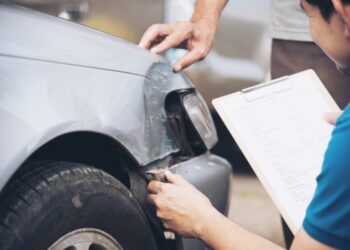A car accident can be a chaotic and overwhelming experience, but what you do immediately after can significantly impact your ability to protect your legal rights. Taking the right steps ensures your safety, helps document the incident, and strengthens your case if legal action becomes necessary. This guide walks you through the essential actions to take after a car accident, ensuring you’re prepared to handle the situation effectively.
1. Ensure Safety First
Your first priority after an accident should always be safety. Assess the situation and take steps to prevent further harm.
Steps to Take:
- Move to a Safe Area: If possible, move your vehicle to the side of the road to avoid obstructing traffic.
- Check for Injuries: Assess yourself and passengers for injuries. If anyone is injured, call 911 immediately.
- Turn on Hazard Lights: Alert other drivers to the accident by activating your hazard lights.
Avoid leaving the scene, as this can lead to legal repercussions. Even in minor accidents, staying at the scene is critical for documentation and legal purposes.
2. Call Emergency Services
Regardless of the severity of the accident, contacting emergency services is an important step. Law enforcement officers can document the scene and create an official report.
Why This Matters:
- Medical Assistance: Emergency responders can provide immediate care for any injuries.
- Official Records: A police report serves as valuable evidence for insurance claims and legal cases.
- Legal Compliance: In many jurisdictions, reporting an accident is required by law.
When speaking to the police, provide factual information without speculating or admitting fault. Stick to the facts of what happened.
3. Document the Scene
Accurate documentation of the accident scene is essential for building a strong case. Gather as much evidence as possible while waiting for authorities to arrive. Seeking legal help after a car accident in Kansas City can also provide guidance on preserving critical evidence and understanding your rights.
Steps to Document the Scene:
- Take Photos: Capture images of the damage to all vehicles, road conditions, skid marks, and traffic signs.
- Record Details: Write down the time, location, weather conditions, and any other relevant details.
- Collect Witness Information: Obtain names and contact details of witnesses who saw the accident.
These records can support your version of events and help your lawyer build a compelling case.
4. Exchange Information
Exchange contact and insurance information with the other driver(s) involved in the accident. Avoid discussing fault or making statements about who is to blame.
Key Information to Exchange:
- Name and contact details
- Insurance company and policy number
- Vehicle make, model, and license plate number
- Driver’s license information
Providing and collecting accurate information ensures a smoother claims process and helps avoid disputes later.
5. Seek Medical Attention
Even if you feel fine, seeking medical attention after an accident is crucial. Some injuries, like whiplash or internal trauma, may not show immediate symptoms.
Why This Matters:
- Detect Hidden Injuries: A medical professional can identify injuries that may not be immediately apparent.
- Create Medical Records: Documentation of injuries provides critical evidence for your case.
- Protect Your Health: Early treatment prevents minor injuries from worsening over time.
Follow all medical advice and keep records of your treatments, diagnoses, and any associated expenses.
6. Notify Your Insurance Company
Contact your insurance provider as soon as possible to report the accident. Provide accurate and honest information about what happened, but avoid speculating or admitting fault.
Information to Share:
- Date, time, and location of the accident
- Names of involved parties and witnesses
- Police report number (if available)
- Photos and documentation from the scene
Your insurance company can guide you on next steps, including filing a claim and arranging for vehicle repairs.
7. Avoid Speaking with the Other Party’s Insurance Adjuster
After an accident, you may be contacted by the other party’s insurance company. Be cautious during these interactions, as their goal is often to minimize payouts.
How to Handle Calls:
- Politely decline to provide a recorded statement.
- Avoid discussing the extent of your injuries or damage to your vehicle.
- Refer them to your lawyer for any further communication.
Speaking without legal guidance can inadvertently harm your case, so it’s best to let your attorney handle these discussions.
8. Consult a Car Accident Lawyer
If the accident involves significant damages, injuries, or disputes, consulting a car accident lawyer is essential. An experienced attorney can protect your rights and ensure you receive fair compensation.
What a Lawyer Can Do:
- Investigate the Accident: Gather additional evidence and interview witnesses.
- Negotiate with Insurance Companies: Handle communications to maximize your settlement.
- Advocate in Court: Represent you if the case goes to trial.
Contacting a lawyer early ensures your case is handled correctly from the start, increasing your chances of a favorable outcome.
9. Keep Detailed Records
Maintaining thorough records is vital for both legal and insurance purposes. Organize all documentation related to the accident in one place.
Records to Keep:
- Police reports
- Medical bills and treatment records
- Repair estimates and invoices
- Communication with insurance companies
- Photos and witness statements
These records provide a clear timeline and evidence of damages, making it easier for your lawyer to build a strong case.
10. Follow Legal and Medical Advice
Finally, adhere to the advice provided by your lawyer and medical professionals. Avoid actions that could undermine your case, such as missing medical appointments or making public statements about the accident.
Tips for Compliance:
- Attend all follow-up medical visits and complete recommended treatments.
- Avoid posting about the accident on social media, as this information can be used against you.
- Respond promptly to requests for information from your lawyer or insurance company.
Staying proactive and cooperative ensures your case proceeds smoothly and increases the likelihood of a favorable outcome.
Conclusion: Take Action to Protect Your Case
What you do immediately after a car accident can have long-term implications for your legal and financial situation. By prioritizing safety, documenting the scene, seeking medical attention, and consulting a lawyer, you can protect your rights and build a strong case.
Navigating the aftermath of an accident can be challenging, but the right steps ensure you’re prepared to handle both legal and insurance matters. Stay calm, follow this guide, and seek professional assistance to safeguard your future.










